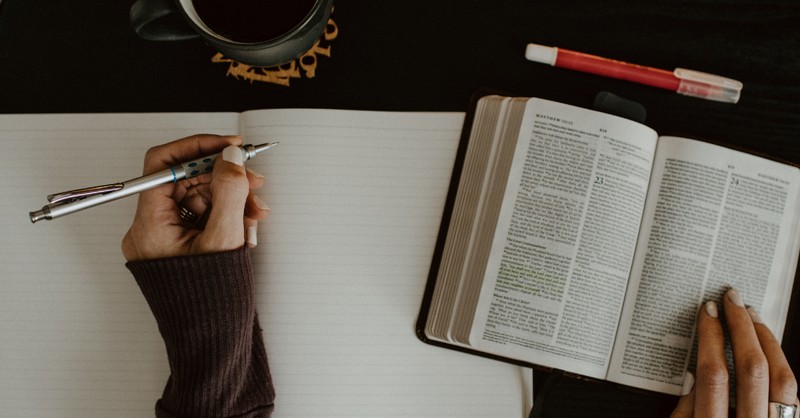
I was knee-high in mud, but getting messy has never caused me anxiety. On the other hand, racing out of the woods during a tornado siren just might. Between shallow breathing and a thousand recitations of Scripture, a million thoughts filled my mind:
Will I make it out alive?
What if I need to carry my mom? Am I strong enough?
Can we find the light at the end of the tunnel?
Is today my last day?
In between snapping tree branches and falling rain, the winds howled louder than a pack of wolves. It was the middle of the day, the hottest part, but you'd never know it. In less than an hour, the weather had gone from 90 and sunny to 70 and shady.
Mom and I had decided to go for a hike but somehow found ourselves on the opposite side of the park, 15 miles from the car. By the time we made it out of the woods, the sirens were so loud our ears were shaking. After convincing the third stranger that we were lost and needed a ride back to our car on the opposite side of the park, we finally felt safe. The storm raged on, but we were inside a vehicle and not running for our lives through the blurred lines of washed-out trails.
Back then, I didn't know how to cope with anxiety healthily, but today, I'd like to share five strategies I've found to help calm my anxious soul. I don't profess to be an expert or counselor, but I offer these suggestions as things I've found helpful over the years. Each one is practical, easy to implement, and was recommended to me by my clinical counselor.
Photo Credit: ©iStock/Getty Images Plus/vladans

1. Deep Breathing
It sounds simplistic, but regulating your breathing when you're anxious is one of the most effective ways to slow your body down. If you're having a panic or anxiety attack, your body is engaging in a flight-or-fight response. This is because your body perceives threats or danger and desires to protect you. The reality is that these perceptions aren't always accurate. Sadly, most of us get stuck between flight or fight when we don't need to.
Deep breathing is a highly recommended activity for reducing anxiety because it triggers the parasympathetic nervous system (PNS). PNS is responsible for relaxing and balancing your body. The sympathetic nervous system (SNS) does quite the opposite. SNS alerts the body in times of danger (like fight or flight). While both play a crucial role in our overall health and are important, a constant state of either (without balance) can cause detrimental results.
One of my favorite ways to practice deep breathing is using the 4-4-8 breath pattern with Scripture. Mentally, I will recite the first half of my favorite Bible verse while breathing in four slow breaths through my nose. After holding for four additional seconds, I will then mentally recite the second half of my favorite Bible verse while breathing out eight slow breaths through my mouth. This practice engages my mind and forces my body to slow down.
In the middle of heightened anxiety, this isn't always easy to do. But with practice, it becomes easier over time. The more I practice deep breathing as part of my lifestyle, the easier it is to implement when I need it most.
Bonus: If you have a friend, spouse, or significant other willing to help you practice, have them count out the seconds for you, gently tap your arm, or guide you through the exercise. Sometimes just having someone walk through the process with you can be comforting.
Photo Credit: ©iStock/Getty Images Plus/PeopleImages

2. Journaling
When I was five years old, I received my first journal. I don't think my parents knew it then, but journaling would quickly become my favorite pastime. Not only does it help me process my thoughts, but it's a way for me to write them as prayers to the Lord.
While there are many scientific studies to reveal the magnitude of journaling and gratitude journaling, I simply want to tell you of its impact on me and my mental health. Sure, writing out thoughts is powerful. We have so many things crossing our minds every day, so it's a great way to jot it all down on paper. But for me, journaling is an exhale. And after holding my breath all day, most days, it's a huge sigh of relief.
The next time you're overwhelmed or anxious, I encourage you to write it all out as a prayer to the Lord. It doesn't have to be pretty; it just has to be real because God desires to hear from you, especially when you're worried or fearful.
Photo Credit: ©Unsplash/Kelly Sikkema

3. Listening to Music
Before leading a worship team, I underestimated the power of worship through song and singing. But there's a reason Scripture tells us to make a joyful noise unto the Lord. While worship can come in many forms beyond music, listening to music is a wonderfully effective method for reducing anxiety.
I've found that playing Christian music during my workout, household tasks, or driving in the car boosts my mood and my energy. It doesn't necessarily take the anxiety away, but it can help put my mind in a different headspace. When we choose to engage in worship despite the messy chaos of our minds, the enemy breaks. Just as God speaks through people and His Word, He can also boldly declare beautiful truths over our lives through the power of music.
Here are some of my top favorite songs to play when I'm feeling anxious:
-"Good Plans" by Red Rocks Worship
-"HELP!" by Brandon Lake
-"Psalm 91: by Shane and Shane
Photo Credit: ©Getty Images/AsiaVision

4. Confessing How I Feel (and Feeling What I Feel)
I've heard it said that confession is good for the soul, and speaking from experience, it does feel freeing. While telling God and others how you really feel can be a challenge, choosing to confess our emotions and allowing ourselves to feel those emotions actually reduces anxiety.
Allowing yourself to embrace how you feel instead of fighting or holding back the emotion is healthier than holding everything in or ignoring it. One of the best analogies for this scenario is a boiling pot of water. Boiling water is essential in cooking. But if you let it boil for too long, the hot liquid will overflow. The bubbles runneth over, and you've burned yourself in the process.
If we don't take the time to be honest with God, ourselves, and others about our emotions, our emotions will quickly overpower us. When we take the time to express, feel, and allow ourselves to embrace them, they lose control. Confessing how you feel and processing those feelings is not only healthy but simultaneously diffuses anxiety and stress.
Photo Credit: ©GettyImages/kupicoo

5. Going Outside
In the beginning, Genesis 1 tells us that God created the world and everything in it. From the mountains above to the seas below, our Creator is a masterful designer. Between flowers and crops to humans and animals, nature reflects the mind behind our Master. How thankful are we for a God who thought to create us?
Within this beautiful world is the power of nature. Placing yourself in this ecosystem not only reduces stress and anxiety but encourages mindfulness, meditation, and reflection. When I'm feeling anxious, my innate coping mechanism is to run, work, or push myself to the brim. Adrenaline courses through my veins and I feel overwhelmed quickly and easily. But instead of giving in to these things, taking long, calm walks through nature is an excellent substitute.
Choosing to go outside when you're anxious allows time and space to breathe in the world God created. When we ground ourselves to the Earth (AKA, reflect on God's goodness and meditate on His blessings), our anxiety melts away. We become more mindful of the moment and less aware of what's bothering us.
The fight to anxiousless living isn't easy or for the faint at heart. I know because it's a battle I still face every day. But with time, practice, and prayer, I hope these five tips will help you reduce anxiety one step at a time.
Agape, Amber
Photo Credit: ©unsplash
Originally published Wednesday, 11 September 2024.








